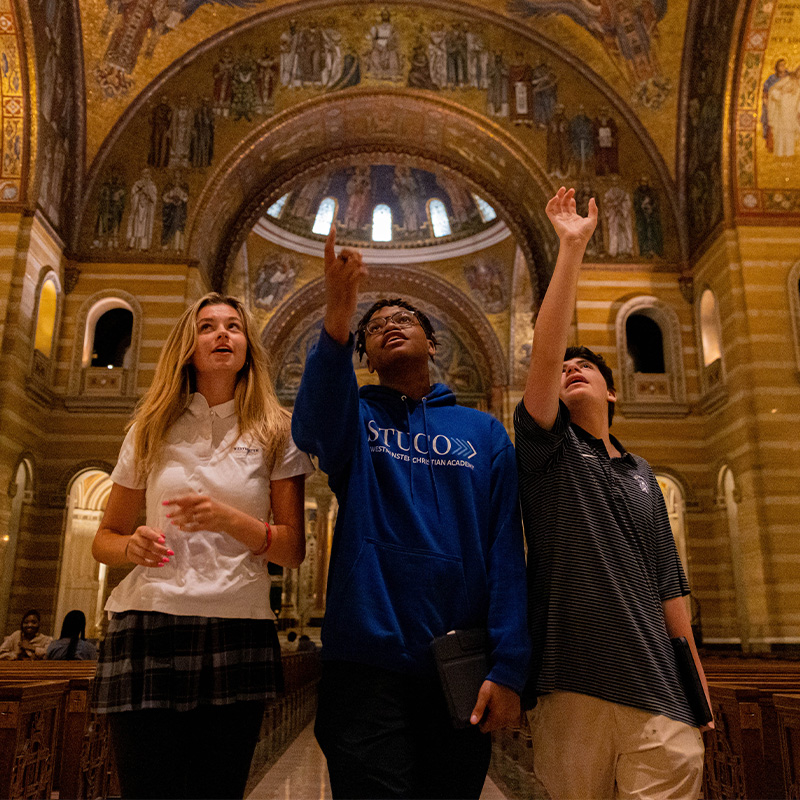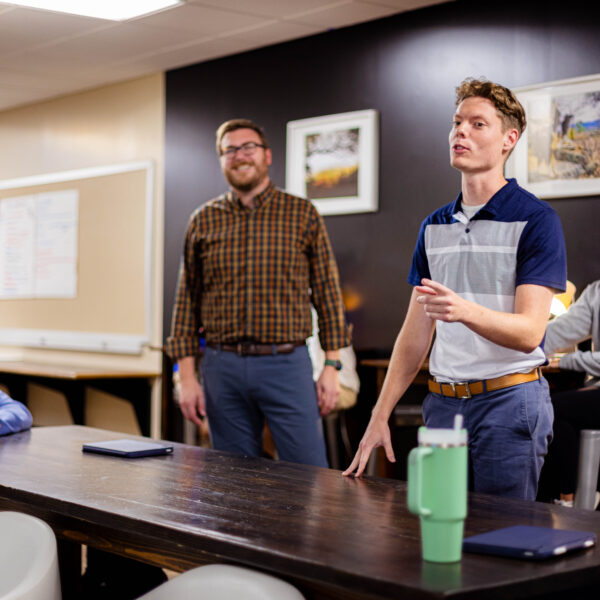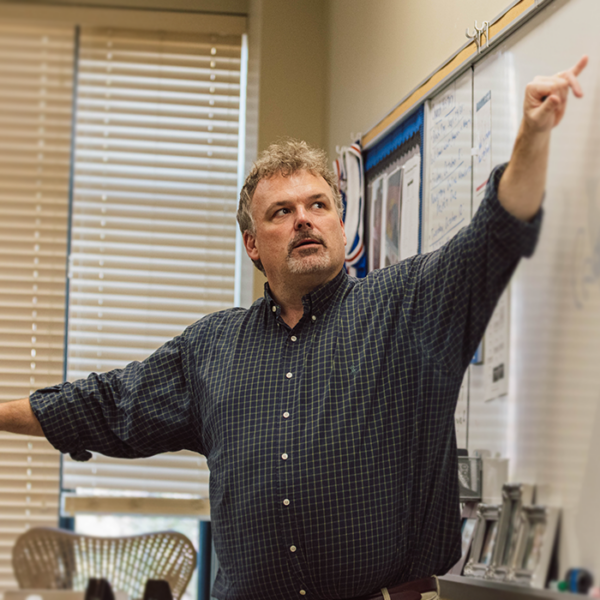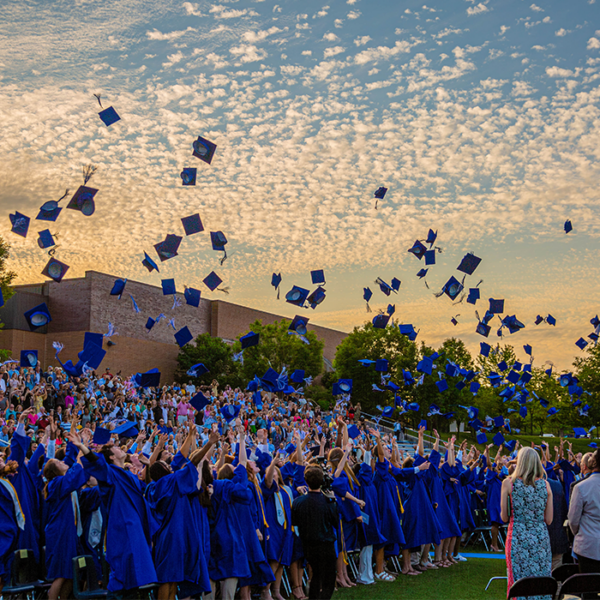More Than Just a Classroom
Equipping Students to Change the World
Atlantic coral and St. Louis, Missouri. The two do not seem to go together in any perceivable way, but the ocean and the midwest are heavily linked at Westminster. Ocean Discovery is an enrichment course for middle school students, and the moment the bell rings, the excitement is palpable.
“God has us working to help restore all that’s been broken,” says Mike Decker, Director of STEM. “We have people here trying to restore prairies, replanting trees, or restoring the rainforest, but very few are trying to restore the reefs.”
Within the past few months, Westminster became the first and only school in the world to receive a federal license to grow Atlantic coral. With this license, plans are in place to grow unique genetic samples to send to 20 different aquariums across the country that catalog and maintain coral in the unfortunate event that the world loses its natural coral reefs. What an incredible and beautiful way to restore the world through scientific research!
Mr. Decker’s goal for STEM at Westminster is to be a platform for students to see how what they are learning can be used for God’s kingdom:
“[At Westminster], we want to be part of cutting-edge technology and movements and plug our students into these industries and organizations so they see that whatever they aspire to do, they can do. It doesn’t matter where you live or what you’re passionate about. You can help in God’s restoration work wherever it is on the planet.”
As students think through complicated moral and philosophical questions about preservation, Mr. Decker connects God’s creation and His original design. Why do we need to protect the world God created? “The affirmation is seeing the fire in the kids,” says Mr. Decker. “It’s an [optional] enrichment class in conjunction with WestminsterYOU but they show up and want to know everything going on.”
Education is more than sitting in a classroom learning facts and practicing recitation. It is discovering real, practical ways to utilize what is learned in school. This is true of the STEM curriculum, but it is also a fundamental philosophy of other disciplines and studies at Westminster.
Early in the semester, the sophomores had the chance to leave the school on a field trip for their Western Civilization class to see the Cathedral Basilica in St. Louis. More than simply being an opportunity to get out of the building for a bit, the trip reflects what Rev. Jacob Skogen, history teacher, desires for his students: to experience beauty in such a way that they feel it in their hearts and souls.
As Rev. Skogen says, “I think a lot of education is too between the ears. There’s not enough of putting our bodies in positions where we are literally responding to an inaudible message.
“To watch these kids walk into the Basilica, there is an immediate hush. Through art and architectural design, there are so many signals that say you are in another world. The building is speaking to them.”
Weeks later, sitting in class, as students began to think about Martin Luther in particular, Rev. Skogen asked them to draw connections to the past by referencing the trip to the Cathedral Basilica. He had them put themselves in the historical space to better understand the motivations and reasons for historical events such as the Reformation, which would be much more difficult without the trip as a point of reference.
Having the opportunity to make these real-world connections between what students are learning in the classroom and what they can experience in the world outside of school is an invaluable aspect of Westminster’s education philosophy of preparing and equipping students to engage the world and change it for Jesus Christ. Mindy LeVar’s Mock Trial class had an opportunity to go to the local courthouse in St. Louis to sit in on an actual trial this past semester.
The Mock Trial class allows students to work through what a legal trial looks like by assigning students to various roles, such as witnesses, plaintiffs, and defendants. Mrs. LeVar says, “When we’re here in the classroom, even though it’s Mock Trial, it’s still a classroom.” Having the opportunity to leave the school for a day and experience an actual trial allowed the Mock Trial students to “enter that sacred space of a courtroom where there are courtroom decorum expectations, judges, lawyers, and people facing the possibility of losing their liberty.”
The students worked throughout the semester to learn parts of the judicial system and courtroom proceedings, such as understanding witness examinations, when and how to make objections, and why the truth matters. But while their classroom trial is hypothetical, real people are going through legal situations.
Mrs. LeVar wants her students to understand that truth matters because it matters to God. God calls us to righteousness, to love mercy, and to seek justice.
It’s not a call for the future but for the present, and it can be difficult at times for students to comprehend that what they are learning in their classes serves to equip them with the tools and knowledge to answer God’s call. The trip to the courthouse showed the students that there is a real-world application to their education.
We want our students to take their education seriously and find ways to utilize what they’ve learned to change the world; however, real-world application does not have to occur only when they graduate. There are opportunities for students while attending Westminster to apply their education. Pawprint Coffee, our coffee shop operating out of the Hub, is a great example.
Recently, the senior entrepreneurship class running Pawprint Coffee visited Kaldi’s Coffee headquarters in downtown St. Louis. Kaldi’s has been supplying Pawprint with ingredients and supplies since the coffee shop first opened in the school in 2017 and has been a crucial partner ever since. The trip to Kaldi’s HQ was fun and educational for our students. They learned more about where their coffee supplies come from and about pursuing sustainability, building relationships, and restoring the world through business.
Senior Megan Fuller said that what stood out the most to her was that “[Kaldi’s] stood by their core values in how they treat their customers and employees, and in the thought they put into the vibe of each restaurant location.” The seniors at Pawprint work hard to implement a similar workplace environment. Megan said that one of the most exciting things she noticed in Kaldi’s business model was that their “employees meet up once a week to brainstorm how to improve the flow of their business.” This is what the entrepreneurship class strives to implement in the classroom.
For Reformation Day, the students worked on developing themed coffee ideas related to the holiday. What drinks would they offer? What names should they give the coffee orders? One student brought up allergy concerns. How can we protect students with allergies while providing a fun drink like the 95 Reese’s (a play on Martin Luther’s 95 Theses)? The seniors worked together to answer these questions, and on Reformation Day, the fun, new drinks were an instant success, with many requesting the drinks be offered year-round.
The trip to Kaldi’s HQ allowed the seniors to see what makes a business successful and to figure out what aspects of these models can be integrated with Pawprint. The entrepreneurship class, in turn, gives our seniors a real hands-on experience to practice everything they’ve learned and put it into action as they look forward to graduation and beyond.
The success or failure of Pawprint Coffee depends on the students, and by giving them a practical opportunity to implement their ideas, they see how what they are learning in the classroom can engage and change the world.
The mission and vision of Westminster are to see our students thrive in a rigorous academic setting so that they are ready and willing to share their God-given gifts with a world in desperate need of His love and mercy. By sending our students on trips to the Cathedral Basilica or local courthouse or providing them with a space to practice what they are learning, whether it is serving coffee on an early Monday morning or growing Atlantic coral, we are better equipping our students to live faithful lives and change the world for Jesus Christ. Christian education is more than just recitation and factual knowledge. It is about learning how to draw connections across multiple disciplines and curricula to seek restoration for our broken world. These trips and practical applications lead our students to a simple question:
How can you be part of God’s restoration here and now?
This article was originally published in our alumni magazine, Chimes. Read more from the Winter 2022 issue.




